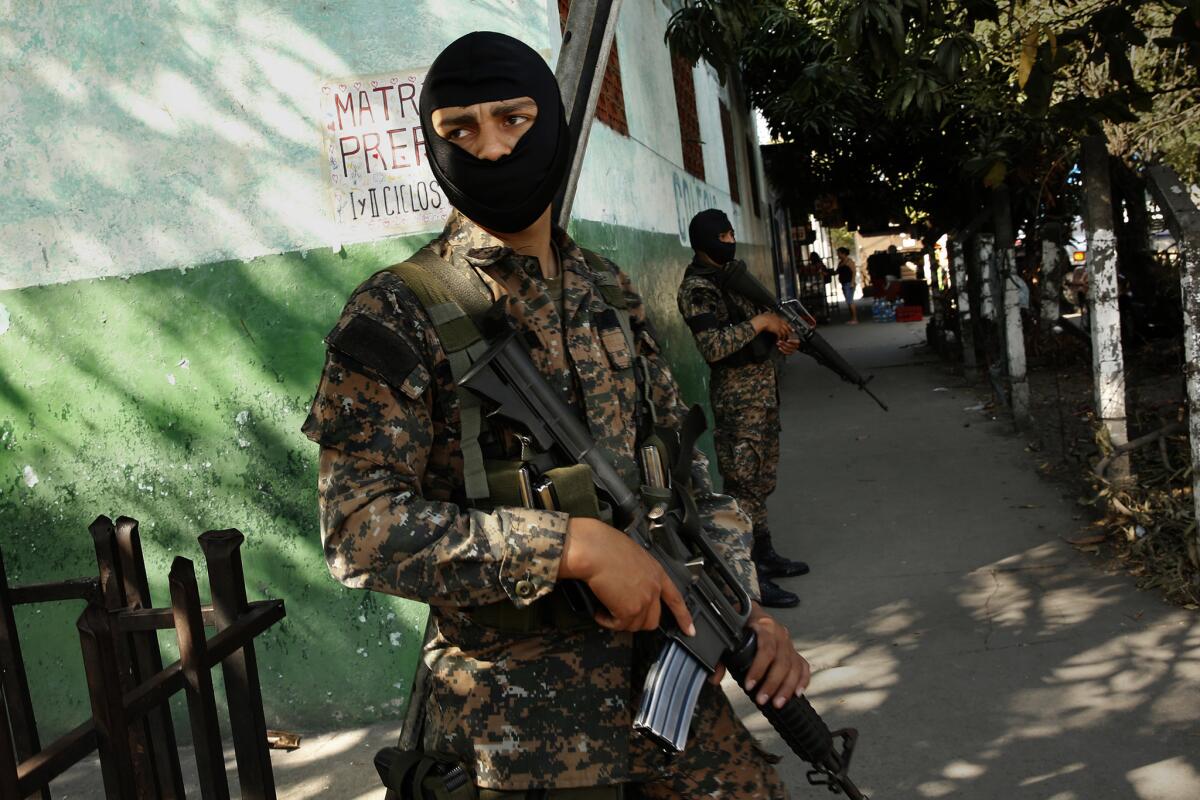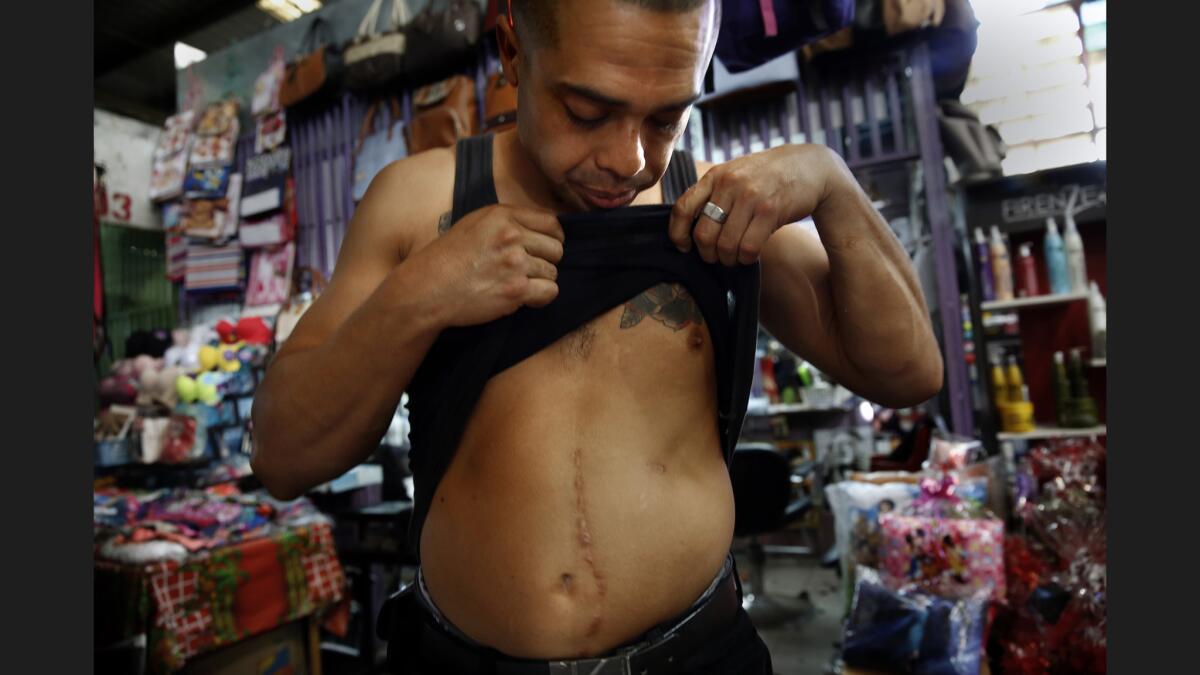In El Salvador, gangs are enforcing the coronavirus lockdown with baseball bats

- Share via
SAN SALVADOR — El Salvador recently celebrated a historic feat: For two days in a row last month, the country recorded not a single homicide.
In a nation that for years led the world in per-capita killings, the 48 hours without a murder came amid a sudden drop in violent crime. Homicides fell from 114 in February to 65 in March.
Driving the decline was not a gang truce or a new police strategy but a weeks-long national quarantine to slow the spread of the coronavirus.
The street gangs that have long terrorized El Salvador have now turned their attention from extortion and killing to a more pressing matter: enforcing social distancing restrictions, often with threats and baseball bats.
Mexican President Andres Lopez Obrador angered many when he shook hands with the mother of notorious drug lord Joaquin “El Chapo” Guzman.
The gangs assumed their role as public health thugs after President Nayib Bukele ordered a 30-day lockdown that started March 22.
In many parts of the country, the gangs are more effective than government authorities, with tactics that include circulating recordings on messaging applications threatening people who break the rules.
“We don’t want to see anyone in the street,” says one recording. “If you go out, it better be only to the store, and you better be wearing a mask.”
The gangs have also produced videos showing masked members hitting people for not adhering to the quarantine.
Other countries in Latin America and the Caribbean have seen similar reductions in killings since stay-at-home orders were issued.
In Colombia, where guerrilla leaders ordered a one-month ceasefire timed to a nationwide quarantine, homicides have fallen by half.
In Guatemala and Honduras, homicides have dropped by about a third, in large part because there are fewer people on the streets to threaten and kill.
In a part of the world where widespread poverty and low investment in public health could make the coronavirus especially devastating, the reduction in killings is a welcome bit of positive news.
It is also a rare respite for a region that is home to just 8% of the world’s population but nearly a third of its homicides.
El Salvador has been dominated by organized crime since the 1990s, when deportees from the United States brought back with them two gangs, Barrio 18 and Mara Salvatrucha.
The government has said that, in this nation of just over 6 million, nearly half a million people are connected to the gangs, which make money by extorting money from small businesses as well as smuggling and selling drugs.

In recent years, the government has taken what it calls an “iron fist” approach to criminal groups, sending soldiers armed with automatic weapons and dressed in black balaclavas into gang-controlled areas.
The country’s leaders say their strategy is working, pointing to a decline from peak homicide rates in 2015. Human rights organizations, though, blamed gangs for an uptick in forced disappearances, suggesting they were simply changing their tactics. Many believe the gangs have formed pacts with the government to keep bodies out of the streets.
“The gangs have retained their territorial control, and in many areas surpass the power of the state,” said Celia Medrano, the director of programs at human rights group Cristosal.
The fact that gangs appear to be enforcing the quarantine “just confirms that they are in control,” she said.
In San Salvador, the nation’s capital, the streets are eerily empty.
On the day the national lockdown began, gang members in one Mara Salvatrucha-controlled neighborhood warned residents to obey the rules. “They said, ‘We don’t want the virus here,’” said a 25-year-old delivery driver from the neighborhood who out of fear asked to be identified only by his first name, Miguel.
“People are not afraid of the police, but of the gang,” he said.
He said the gangs worry that high rates of infection could do long-term damage to their business and bring unwanted attention from government authorities.
For now, the gangs appear willing to accept some losses.
In a neighborhood controlled by an offshoot of the Barrio 18 gang in San Salvador, hit men have told small-business owners and taxi drivers that they are exempt from paying extortion fees, known as renta, while the quarantine lasts.
But it is unclear how long the newfound peace will last.
“Once the quarantine ends, they’ll have to pay what they owe,” said a barber in the neighborhood, who asked to be identified only by his first name, Rafael. “I think that homicides are going to increase after the quarantine because the gang is not going to forgive the debt, and they are going to kill whoever does not pay.”
Here and across Latin America, which last year saw a wave of protest movements in several countries over income inequality, there are growing concerns about possible social unrest if lockdowns continue.
“El Salvador’s fragile economy could collapse,” said Jeannette Aguilar, a security analyst in San Salvador. Half of the nation’s population works in the informal economy, she said, and few have savings.
Remittances from abroad — which account for roughly 20% of the country’s GDP — are already falling, she said.
“A quarantine is a different thing if your refrigerator is empty,” she said. “There could be a huge increase in robberies and other crime because people are desperate and hungry.”
She is among a growing number of experts who believe a global recession — and the likelihood of attendant violence —
might fuel new waves of migration to the United States.
“The economic predicament that will be left by this crisis when it’s over will just fuel and feed into the structural conditions that lead thousands of people to flee their countries,” said Tiziano Breda, a Guatemala-based analyst for the International Crisis Group.
He said that gangs in Guatemala were already evolving in the face of coronavirus-related restrictions, including the suspension of bus routes, that have deprived them of income.
Some gangs have shifted to extorting people in their homes instead of their places of business, he said.
He worries that gangs may also have their sights on the $130-per-family subsidies promised by the government to counter the economic devastation that the coronavirus is expected to bring to one of the world’s poorest countries.
“They are in a wait-and-see mode, to try and figure out which source of income they can replace,” Breda said.
One nation in the region that has not seen a decrease in crime is Mexico, which recorded 2,585 homicides in March, according to preliminary government data. That is more than in any month in nearly two years.
April is off to a similarly bloody start. Over the weekend, a shootout between rival drug cartels left 19 people dead in the northern border state of Chihuahua.
A key reason that violence has not declined in Mexico is because President Andres Manuel Lopez Obrador was much slower in responding to the coronavirus threat than were other countries in the region. It was only last week that Mexico asked “nonessential” workers to stay home, and the country has not imposed any travel restrictions or curfews.
In some parts of Mexico, armed groups have been preparing for a possible lockdown. Gangs in Tamaulipas and Michoacan states were reported to be dispensing food and other supplies to local residents this week.
In Guerrero state, which is controlled by a patchwork of armed gangs and self-proclaimed self-defense groups, some have set up checkpoints around their communities to keep the virus out, said Falko Ernst, senior analyst for Mexico at the International Crisis Group.
He says he worries that in parts of the country where law and order is largely absent, the coronavirus may only embolden armed groups, especially as Mexican soldiers and other federal forces are moved from peacekeeping activities to coronavirus containment efforts.
“We are at risk of these conflicts being further unleashed,” Ernst said.
Linthicum reported from Mexico City and O’Toole from Washington. Renderos, a special correspondent, reported from San Salvador.
More to Read
Sign up for Essential California
The most important California stories and recommendations in your inbox every morning.
You may occasionally receive promotional content from the Los Angeles Times.












